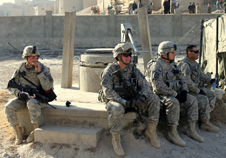3Qs: Tension builds over Afghanistan massacre

Last week, a U.S. staff sergeant stationed at a military outpost near Kandahar, Afghanistan, allegedly opened fire in Afghan villages and killed 16 civilians. The Taliban vowed vengeance for the civilian deaths, and the incident prompted demands by many for an immediate withdrawal of U.S. troops from Afghanistan. Afghan President Hamid Karzai accused the U.S. of blocking the Afghan probe into the incident and requested that American troops be confined to major military bases in the country by next year. We asked Kimberly Jones, a faculty associate in Northeastern University’s Middle East Center for Peace, Culture and Development, to analyze the possible implications of this developing situation.
How will this incident — particularly in light of Karzai’s reaction — affect the U.S. plan to withdraw troops from Afghanistan?
For a range of reasons, the United States needs to wrap up the bulk of its military engagement in Afghanistan; this has to do with domestic (U.S.) concerns as well as the situation on the ground there. In terms of the impact of recent events on this plan, I think we need to take care not be too reactive. We cannot afford to change the timetable too hastily. Although critics of U.S. policy might argue that we should have withdrawn ages ago, our engagement — and military disengagement — with Afghanistan is complex. Afghanistan has known conflict for decades. Our actions, such as troop drawdowns, are controllable and cause reactions on the ground there. We need to be able to anticipate those reactions and plan for them so that the best possible outcome for the Afghans is possible.
How will the attack affect U.S.-Afghanistan relations?
A range of relationships are affected, but the two most discussed in connection with this horrific attack are state-to-state interactions as well as engagement between Afghans and U.S. forces on the ground. State-to-state relations have already become a bit more complicated and will continue that way, especially if domestic pressure on Afghan President Hamid Karzai increases appreciably and is maintained over time. We have seen some of this play out with the requested pull-back of troops.
The more localized environment could change significantly. The incident adds to the Taliban’s list of grievances, for example, which resonates with segments of the population, increasing their support. It could also fuel more “reprisal” attacks. Moreover, these acts serve to undermine some of the positive relationships that have been built up over time, between U.S. forces and the Afghan population.
Two points are missing from a lot of the conversation about this attack. First is the impact on Afghans, particularly those who were traumatized by the killings or who lost family or friends. Second, we too often see Afghanistan as an issue, particularly a military one. This then blinds or impairs our vision of the broader conflict context that includes governance, development and human rights. All of these are interconnected to each other as well as to the creation of a sustainable, secure state.
What is the cumulative effect on the global perception of Americans following this incident and others, including the accidental Koran burnings by U.S. soldiers?
There are still many questions to be asked and answered about this event, but these look to be individual acts — isolated decisions and choices, horrendous as they may be. Importantly, many U.S. troops in Afghanistan conduct themselves honorably and with courage in very difficult circumstances.
The one way I would say they are “connected” is in terms of their consequences. They obviously impact the Afghan population and can reinforce negative perceptions of U.S. forces. In addition, these three incidents are part of a larger set of issues that many Afghans have with United States’ policies and actions — ranging from drone strikes to detentions at Bagram. Further complicating matters are the varying perspectives on U.S. disengagement and what comes next.
This can all seem overwhelming and in some ways it is. Our challenge, however, should not be to solve or fix Afghanistan, but rather to find ways to empower Afghans across the country to meet the challenges they face. This trio of incidents make this more difficult, but not impossible.





